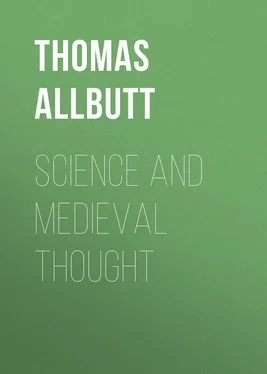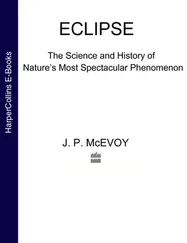Thomas Allbutt - Science and Medieval Thought
Здесь есть возможность читать онлайн «Thomas Allbutt - Science and Medieval Thought» — ознакомительный отрывок электронной книги совершенно бесплатно, а после прочтения отрывка купить полную версию. В некоторых случаях можно слушать аудио, скачать через торрент в формате fb2 и присутствует краткое содержание. Жанр: foreign_antique, foreign_prose, на английском языке. Описание произведения, (предисловие) а так же отзывы посетителей доступны на портале библиотеки ЛибКат.
- Название:Science and Medieval Thought
- Автор:
- Жанр:
- Год:неизвестен
- ISBN:нет данных
- Рейтинг книги:4 / 5. Голосов: 1
-
Избранное:Добавить в избранное
- Отзывы:
-
Ваша оценка:
- 80
- 1
- 2
- 3
- 4
- 5
Science and Medieval Thought: краткое содержание, описание и аннотация
Предлагаем к чтению аннотацию, описание, краткое содержание или предисловие (зависит от того, что написал сам автор книги «Science and Medieval Thought»). Если вы не нашли необходимую информацию о книге — напишите в комментариях, мы постараемся отыскать её.
Science and Medieval Thought — читать онлайн ознакомительный отрывок
Ниже представлен текст книги, разбитый по страницам. Система сохранения места последней прочитанной страницы, позволяет с удобством читать онлайн бесплатно книгу «Science and Medieval Thought», без необходимости каждый раз заново искать на чём Вы остановились. Поставьте закладку, и сможете в любой момент перейти на страницу, на которой закончили чтение.
Интервал:
Закладка:
Even Francis Bacon, who was deeply indebted to Aristotle, never extricated himself from the tangle of form, cause and law 16 16 It were almost to be desired, for our own lucidity, that we could get rid of the words cause and law, and use language significant of order only. Aristotle’s influence has weighed heavily in favour of studying “Causes” rather than sequences; thus it is hard to clear our own minds, and impossible to clear the minds of our pupils, of a genetic notion of causation – that an effect comes, as it were, from the womb of its causes. Even Ockham taught as if causes contained their effects. Mr Marshall (West. Rev. loc. cit.) is of opinion that Roger Bacon by his “non oportet causas investigare” intended to confine scientific thought to the relations of phenomena.
.
Now this was a great argument, no empty dispute; the bones of dead controversies cumber the ground, but no controversy was empty which moved profoundly the minds and passions of men: both for ecclesiastical and secular thought the dispute was grave. While realism was essential to the Church – for instance, on realist grounds St Anselm defended the medieval doctrine of the Trinity against Roscellinus; the Church herself claimed a real existence apart from the wills of successive generations of individual and variable men; she taught that Man had fallen not only in many or all individual cases, but as a kind having a real existence 17 17 As St Anselm put it, “Participatione speciei plures homines sunt unus homo.” Out of humanity individual men proceed.
, and again that in the Mass there is change of hypostasis 18 18 Vid. p. 32, note.
– while then realism was essential to the Faith, yet if forms pre-exist (“ante rem”) then the acts of God must be predetermined – “fatis” non “avolsa voluntas”; or if forms are only “in re” God must be form, living in each and every act and thing, which is Pantheism (“materia omnium Deus”): an impersonal conception and a dissolution of dogma which the Church must and did abhor. “Pessimus error” – there is the abyss, cried Albert, avoiding it by dialectical juggles. Erigena, the brilliant prophet and protestant 19 19 Erigena, “the miracle of the Holy Ghost”; a figure of almost mythical grandeur, arising in the far west, full of new learning, of lyric enthusiasm, and heroic courage. He did not protest, with St Columba, against the Papacy only; he protested against authority, and he protested against mighty ignorance; neither of which should withstand the persuasion of right reason. “Ratio immutabilis … quæ … nullius auctoritatis adstipulatione roborari indiget.” His works were proscribed and burned.
of the first period of the scholastic philosophy, was virtually a pantheist after the pattern of Parmenides 20 20 The one, to which alone Parmenides and Melissus attributed existence, was a material although an incorporeal unity. We must beware of accepting “matter” in the current dualist sense; for Aristotle himself ὕλη was hardly distinguishable from δύναμις.
; as Spinoza was the last great realist. David of Dinan again was such a pantheist, though luckily for him the Church did not find it out till he was dead; and he was martyred only in his bones. Indeed the great Robert of Lincoln barely escaped the accusation of pantheism under the wing of Augustine. The heresies of David, and of Amaury, caused the reaction of the first years of the 13th century against Aristotle. Amaury seems indeed to have cleared out Christian dogma pretty thoroughly, and to have preached the coming of science as the “third age” of the world. Many of his followers were sent to the stake; by the Synod of Paris (1209) the works of Aristotle were proscribed, and many copies of them burned. This proscription was virtually withdrawn by Gregory the Ninth in 1231; and Hales, Albert and St Thomas devoted themselves again to the study of Aristotle, and established his supremacy 21. Indispensable then as realism was for the Church, its creed, and its sacraments, yet therein it found itself in a dilemma between the conceptions of a Creator working under conditions, and of a spirit immanent in matter; and when theological philosophy culminated in St Thomas, and was fixed by him as it now rules in Rome, this difficulty was rather concealed in his system than resolved 22. Every scheme of thought must make some declaration on the nature and place of universals; the problem was no hair splitting 23, it dealt with the very nature and origin of being; it agitated the minds of thinking men at a time of the most fervid and widespread enthusiasm for knowledge which the Western world has ever known, – at a time when Oxford counted its students by thousands, and when in Paris a throng athirst for knowledge would stretch from the cloisters of the Mathurins to the faubourg of St Denis 24; and, in respect of our theme of this day, we shall see that even Harvey was embarrassed by certain aspects of it.
For, to resume, closely allied to the argument concerning universals was that concerning “form and matter.” Whether the terms used were “form and matter,” force or energy or “pneuma” and matter, “soul or life” and “body,” “determinative essence and determinate subsistence,” “male principle and female element,” “archæus and body,” the potter and the clay of the potter; or whether again they were “type and individual,” “cause and effect,” “law and nature,” “becoming and being,” or even the “thought and extension” of Descartes, the riddle lay in the contrast of the static and dynamic aspects of things; in the incessant formation of variable and transitory individuals in the eternal ocean of existence 25.
“Spiritus intus alit, totamque infusa per artus
Mens agitat molem, et magno se corpore miscet.”
For early thinkers, untrained in the methods and unaware of the limits of thought, even for the great and free thinkers of Greece, a captivating analogy was irresistible 26; while inventing schemes of thought they believed themselves to be describing the processes of nature. Moreover it has been the temptation of philosophers of all times, and even of Harvey himself than whom none had put better the conditions of scientific method, to suppose that by means of abstraction kinds may be apprehended; that thus they may get nearer to the inmost core of things; that by purging away the characters of individuals they may detect the essence and cause of individuation (σπερματικὸς λόγος): not perceiving indeed that the content of notions is, as Abélard had pointed out plainly, in inverse proportion to their universality. Like Sidney’s hooded dove, the blinder they were the higher they strove 27. For example: from a lump of silver a medal is struck; from many lumps of silver many medals are struck, each different from the other: let us eliminate as accidents the notions of silver, of the blow of a hammer, even of particular features of the devices, and we shall reach the idea of an agent with a type or seal, or of such an agent with many seals, or ideas, who may thus individualise indifferent matter; or, to penetrate deeper into abstraction, who may transfer forms of his own activity to motionless stuff. It is my part to-day to show that before motionless stuff – before the problem of the “primum” mobile” – even Harvey himself stood helpless; helpless yet fascinated by the indulgence of invention when, in the De motu cordis , or the De generatione , he permitted himself to carry contemplation beyond the sphere of his admirable experiments. “Natural, vital and animal spirits” indeed he would have none of; saying well that he should want as many spirits as functions, and that to introduce such agents as artificers of tissues is to go beyond experience: yet in his need of a motor for his machine he was not able to divest himself of the language nor even of the philosophy of his day; he referred the cause of the motion of the blood, and therefore of the heart, to innate heat 28. In his day he could not but regard rest and motion as different things; and motion as a super-added quality. In denying the older opinion 29that the heart is the source of motion, of perfection 30and of heat, he put the difficulty but one stage back; and, when in the treatise on Generation he propounded his transcendental notion of the impregnation of the female by the conception of a “general immaterial idea,” we find in him realism still very much alive indeed. Had Harvey been content with innate heat he would have done well enough; but the innate heat of the blood, as he explains it, is not fire nor derived from fire; nor is the blood occupied by a spirit, but is a spirit: it is also “celestial in nature, the soul, that which answers to the essence of the stars … is something analogous to heaven, the instrument of heaven.”
Читать дальшеИнтервал:
Закладка:
Похожие книги на «Science and Medieval Thought»
Представляем Вашему вниманию похожие книги на «Science and Medieval Thought» списком для выбора. Мы отобрали схожую по названию и смыслу литературу в надежде предоставить читателям больше вариантов отыскать новые, интересные, ещё непрочитанные произведения.
Обсуждение, отзывы о книге «Science and Medieval Thought» и просто собственные мнения читателей. Оставьте ваши комментарии, напишите, что Вы думаете о произведении, его смысле или главных героях. Укажите что конкретно понравилось, а что нет, и почему Вы так считаете.












